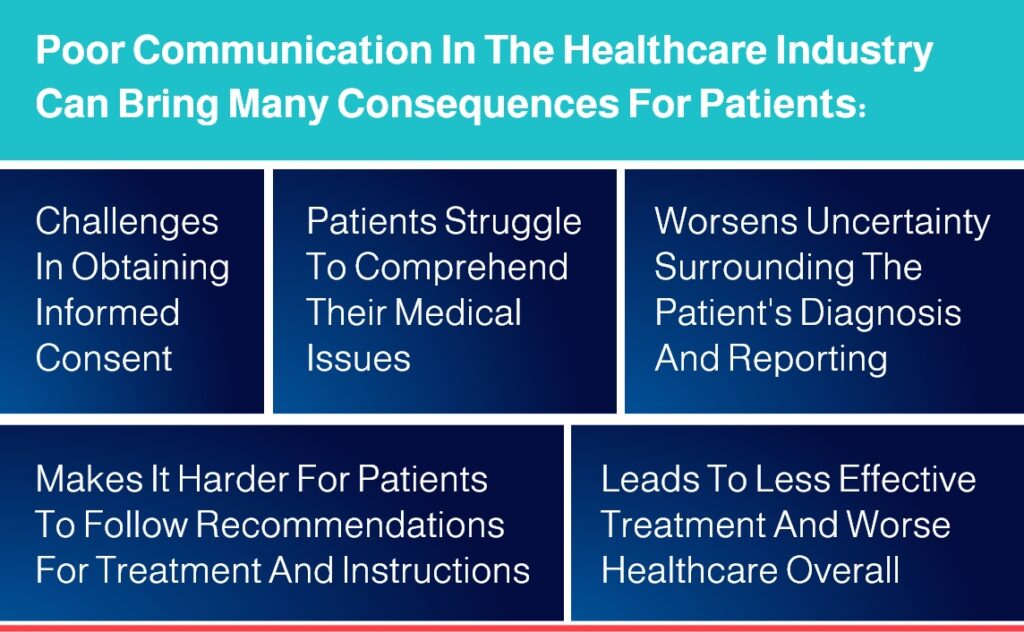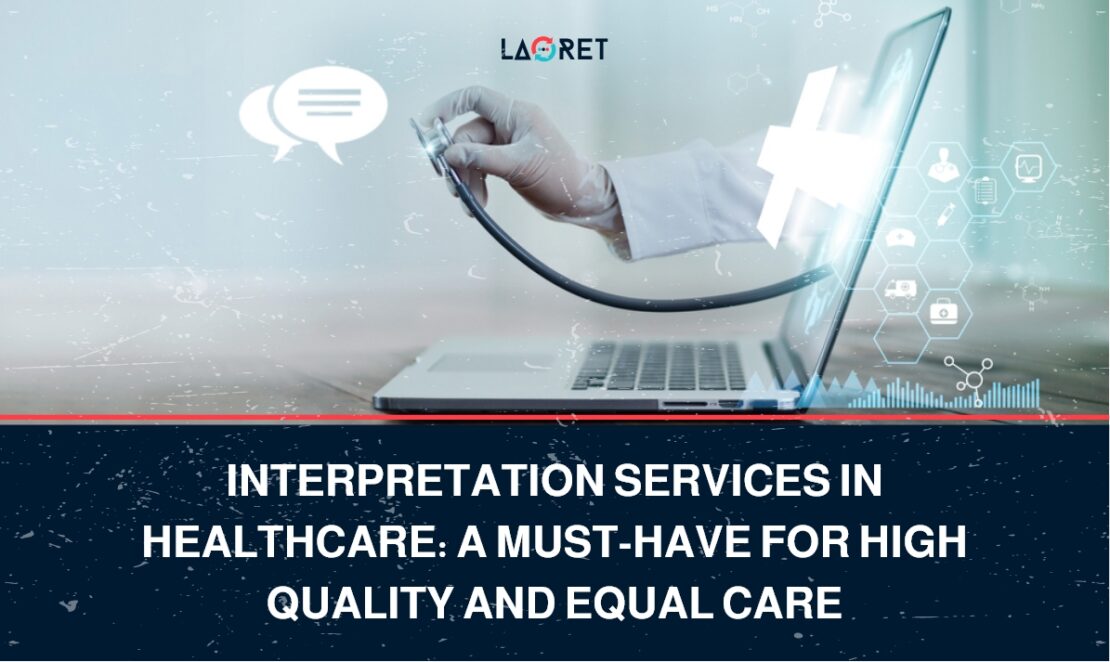Interpretation Services in Healthcare: A Must-Have for High Quality and Equal Care
Among all industries, healthcare stands to benefit the most from interpretation services. That’s because it comes across diverse patient groups, including those who may not speak the same language as their caregivers.
In many situations, informal interpretation takes place, where family members, friends, and staff that have some knowledge of the language act as interpreters. But, without proper training in interpretation and the medical field, errors may occur, posing serious consequences in health outcomes as well as legal liabilities.
If you are a healthcare provider, you can avoid this all if you decide to add accurate interpreting services, offered by trained and qualified interpreters who have knowledge of medical systems and terminology. Overall, healthcare interpretation is crucial in ensuring that patients with limited English proficiency or those who speak different languages and dialects receive proper medical care.
You will not only show your commitment to inclusivity and fighting inequality, but you will also gain a competitive advantage as a facility that values accurate communication with its patients. In this article, we will discuss the various types of interpretation services in healthcare and their benefits.
3 Main Types Of Interpretive Services in Healthcare
Language interpreters provide oral translations of written documents and other communications to patients on-site, through phone calls, or via video calls in the language they understand.
Over the last decade, virtual interpreting services have grown in popularity, with the peak during the pandemic, when visiting a hospital was not a good idea due to the high risk of infection. Healthcare organizations discovered virtual interpreting services to be an excellent way to deal with full capacity in hospitals and thus better manage their spaces and resources. In addition, the cost of virtual interpreting services is also lower than on-site interpreting services. So, it was and is a win-win situation for everyone included.
-
On-site Interpretation Services
In this case, the medical interpreter is physically present at the healthcare facility and collaborates with the nurses and doctors to translate everything as it happens to the patient. They can explain tasks and procedures and assist them in signing informed consent forms and other documents that are not in their native language. Interpreters can also assist them in asking questions to the doctor and reassure the patient if they are uncomfortable during the visit. On-siteinterpretation services in healthcare are also extremely useful in medical tourism, where people from all over the world come to your hospital to receive expert services. It’s a professional way to make them feel welcomed and valued.
-
Over-the-phone Interpreting Services (OPI)
Due to the demands of today’s healthcare field, telephone interpreting is a service you should have at hand. They’re budget-friendly and can be engaged only when the situation arises. They make it easy for your patients and clients to call and get their questions answered, and set or cancel appointments. By hiring OPI medical interpreters, you can rest assured that they’ll professionally handle any short-notice or urgent communication with extreme care and confidentiality.
-
Video Virtual interpreting (VRI)
This type of interpreting uses video conferencing technology to facilitate communication between healthcare professionals and the patient. This method is useful when the interpreter and the patient are not in the same physical location. For example, a remote hospital that serves a rural community may use video interpreting to connect with an interpreter who is based in a different city. VRI is also great for sign language interpreting for deaf or hard-of-hearing patients.For more, read our virtual interpreting guide to learn how it can help you improve communication in many industries.
How Will Interpretation Services in Healthcare Benefit Your Business?
-
Provide Inclusivity for Different Groups in Society
Many groups in society suffer discrimination and exclusion in the healthcare industry, especially people with limited English proficiency (LEP), people with hard of hearing, and others that don’t have basic language access to get healthcare. That’s why as we mentioned, on-site interpretation as well as VRI can help people that use sign language get the medical treatment they need. In many countries, including the United States, the provision of interpreter services for healthcare is required by law. For example, the Title VI of the Civil Rights Act prohibits discrimination on the basis of race, color, or national origin in programs or activities receiving federal financial assistance. This includes healthcare facilities that receive such funding. As a result, healthcare providers are required to provide interpreting services to non-English speaking patients in order to ensure equal access to quality healthcare. Failure to provide such services may result in legal action and the loss of funding.
-
Reduce the Likelihood of Medical Errors & Ensures Legal Compliance
The most serious issue in healthcare is misdiagnosis which leads to improper treatment and medication. One major factor that increases the chances of that happening is ineffective communication where crucial details can sometimes be lost in translation. However, having professional interpreting services for healthcare at your disposal greatly improves the doctors’ understanding of the current problems. Patients can also obtain all the required information and ask all the important questions to enable them to sign the informed consent forms without any worry.Interpreter services break language barriers that can prevent patients from fully understanding their health conditions and treatment options. As a result, you might cause legal and financial troubles for your organization. Therefore, you should use expertinterpretation services in healthcare to comply with the regulation and make sure all the operations run smoothly.
-
Promote Better Communication
When it comes to effective communication in healthcare, relying on the expertise of professional healthcare interpreters is crucial. These skilled individuals possess a wealth of knowledge in both the source and target languages, enabling them to provide essential interpretation services in healthcare as well as accurate translation services with ease. In contrast, relying on family or friends can introduce biased information, potentially leading to miscommunications and misunderstandings. Professional medical interpreters will adhere to strict professional ethics and do not offer suggestions or opinions. They prioritize patient autonomy, empowering individuals to make informed decisions about their care. By facilitating effective communication, interpretation services in healthcare help to ensure optimal healthcare outcomes for all patients.
-
Reduce patient anxiety and increase patient satisfaction
Due to language barriers, patients with limited English proficiency often have higher anxiety levels in hospital settings. Thus, it is better to eliminate those difficulties so that patients feel more confident and comfortable about the status of care they are receiving from the healthcare team. Otherwise, the treatment process will be incomplete, and patients will suffer from enormous mental stress.By ensuring effective communication between patients and healthcare providers, medical interpreting services can increase patient satisfaction, leading to a better quality of care and better health outcomes.Poor Communication in the Healthcare Industry Can Bring Many Consequences for Patients:
- Challenges in obtaining informed consent
- Patients struggle to comprehend their medical issues
- Worsens uncertainty surrounding the patient’s diagnosis and reporting
- Makes it harder for patients to follow recommendations for treatment and instructions
- Leads to less effective treatment and worse healthcare overall

Challenges of Interpretation Services in Healthcare
Due to the technical and sensitive nature of medical communication, interpreting in healthcare settings presents unique challenges. One of the most difficult challenges in healthcare interpretation is conveying complex medical terminology, diagnoses, and treatment plans. Incorrect interpretation can lead to misunderstandings, misdiagnosis, and, ultimately, negative health outcomes.
So just any interpreter won’t do. That’s why it is critical to hire interpreters who are native speakers and experts in medical interpreting. They must have a solid understanding of medical terminology and procedures to ensure that patients fully comprehend their medical information.
In addition, the interpreter should also be able to understand and adapt to cultural nuances and sensitivities. To help you choose the best interpreters you can partner up with a certified language service provider that offers these translation and localization services in the languages you’re interested in.
A specialized LSP that offers both interpreting and translation services will guarantee confidentiality, impartiality, and accuracy in interpreting, which are crucial in healthcare settings. You will not only retain but also grow your business as a result of the enormous positive impact interpreting services for healthcare have on patient satisfaction levels.
Download our comprehensive checklist
Never worked with healthcare interpreters before?
FAQ
What are the advantages of technical translation?
If you cooperate with a technical translation agency to translate technical documents with interest to your target audience, you’ll:
- Build trust and authority which will convert to more sales.
- Increase your profit, brand awareness, and reach.
- Become a pioneer in markets where the said industry isn’t saturated.
- Remain compliant with local regulatory guidelines.
- Connect with foreign audiences by offering valuable technical expertise.
Conclusion
The number one reason why interpretation services in healthcare are a necessity is to guarantee that you can handle and treat any patient, regardless of any language barriers. Failure to provide effective language access can result in medical errors, inaccurate medical history reviews, and legal consequences. Laoret is dedicated to providing exceptional patient experiences by offering language services to individuals who have limited English proficiency or are deaf or hard of hearing. With years of experience and training in translation and interpreting services within the medical field, our team of skilled interpreters can work on-site and virtually. Contact us now and request a quick quote to learn more.
References
- Statista: The world’s most spoken languages
- World Data: The world’s largest economies
- Internet world users by language
- The 10 Largest E-Commerce Markets in the World by Country
- English levels in China
- The most used languages on the internet
- China: Language simplification to increase literacy?
- The main differences between Mandarin and Cantonese
- The Spanish language in the world
- Internet world users by language
- The U.S. Has the Second-Largest Population of Spanish Speakers—How To Equip Your Brand To Serve Them
- Parker pens make you pregnant, and other due diligence fails!
- Arabic Speaking Countries
- Arab economies to post 5.4 percent growth rate this year on higher oil prices
- More Arab countries are seeking to orient their economies towards knowledge
- Individuals using the Internet (% of population) – Arab World
- French speaking countries
- English Loses Currency as Europe’s Lingua Franca After Brexit Vote
- The rise of Africa’s digital economy
- Mechanical Engineering Industry in Germany: Our Industry Report
- Internet user penetration in Germany from 2018 to 2027






